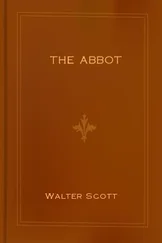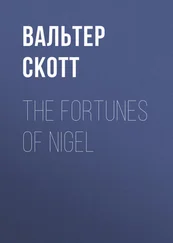Walter Scott - The Fortunes of Nigel
Здесь есть возможность читать онлайн «Walter Scott - The Fortunes of Nigel» весь текст электронной книги совершенно бесплатно (целиком полную версию без сокращений). В некоторых случаях можно слушать аудио, скачать через торрент в формате fb2 и присутствует краткое содержание. Год выпуска: 2004, Жанр: Исторические приключения, на английском языке. Описание произведения, (предисловие) а так же отзывы посетителей доступны на портале библиотеки ЛибКат.
- Название:The Fortunes of Nigel
- Автор:
- Жанр:
- Год:2004
- ISBN:нет данных
- Рейтинг книги:3 / 5. Голосов: 1
-
Избранное:Добавить в избранное
- Отзывы:
-
Ваша оценка:
- 60
- 1
- 2
- 3
- 4
- 5
The Fortunes of Nigel: краткое содержание, описание и аннотация
Предлагаем к чтению аннотацию, описание, краткое содержание или предисловие (зависит от того, что написал сам автор книги «The Fortunes of Nigel»). Если вы не нашли необходимую информацию о книге — напишите в комментариях, мы постараемся отыскать её.
—SIR PHILIP SIDNEY
The Fortunes of Nigel — читать онлайн бесплатно полную книгу (весь текст) целиком
Ниже представлен текст книги, разбитый по страницам. Система сохранения места последней прочитанной страницы, позволяет с удобством читать онлайн бесплатно книгу «The Fortunes of Nigel», без необходимости каждый раз заново искать на чём Вы остановились. Поставьте закладку, и сможете в любой момент перейти на страницу, на которой закончили чтение.
Интервал:
Закладка:
Note XI. p. 136.—SKIRMISHES IN THE PUBLIC STREETS
Edinburgh appears to have been one of the most disorderly towns in Europe, during the sixteenth and beginning of the seventeenth century. The Diary of the honest citizen Birrel, repeatedly records such incidents as the following: "The 24 of November [1567], at two afternoon, the Laird of Airth and the Laird of Weems met on the High Gate of Edinburgh, and they and their followers fought a very bloody skirmish, where there were many hurt on both sides with shot of pistol." These skirmishes also took place in London itself. In Shadwell's play of The Scowrers, an old rake thus boasts of his early exploits:—"I knew the Hectors, and before them the Muns, and the Tityretu's; they were brave fellows indeed! In these days, a man could not go from the Rose Garden to the Piazza once, but he must venture his life twice, my dear Sir Willie." But it appears that the affrays, which, in the Scottish capital, arose out of hereditary quarrels and ancient feuds, were in London the growth of the licentiousness and arrogance of young debauchees.
Note XII. p. 144.—FRENCH COOKERY
The exertion of French ingenuity mentioned in the text is noticed by some authorities of the period; the siege of Leith was also distinguished by the protracted obstinacy of the besieged, in which was displayed all that the age possessed of defensive war, so that Brantome records that those who witnessed this siege, had, from that very circumstance, a degree of consequence yielded to their persons and opinions. He tells a story of Strozzi himself, from which it appears that his jests lay a good deal in the line of the cuisine. He caused a mule to be stolen from one Brusquet, on whom he wished to play a trick, and served up the flesh of that unclean animal so well disguised, that it passed with Brusquet for venison.
Note XIII. p. 145.—CUCKOO'S NEST
The quarrel in this chapter between the pretended captain and the citizen of London, is taken from a burlesque poem called The Counter Scuffle, that is, the Scuffle in the Prison at Wood street, so called. It is a piece of low humour, which had at the time very considerable vogue. The prisoners, it seems, had fallen into a dispute amongst themselves "which calling was of most repute," and a lawyer put in his claim to be most highly considered. The man of war repelled his pretence with much arrogance.
"'Wer't not for us, thou swad,' quoth he,
'Where wouldst thou fay to get a fee?
But to defend such things as thee
'Tis pity;
For such as you esteem us least,
Who ever have been ready prest
To guard you and your cuckoo's nest,
The City'"
The offence is no sooner given than it is caught up by a gallant citizen, a goldsmith, named Ellis.
"'Of London city I am free,
And there I first my wife did see,
And for that very cause,' said he,
'I love it.
And he that calls it cuckoo's nest,
Except he say he speaks in jest,
He is a villain and a beast,—
'I'll prove it!
For though I am a man of trade,
And free of London city made,
Yet can I use gun, bill, and blade,
In battle.
And citizens, if need require,
Themselves can force the foe retire,
Whatever this low country squire
May prattle.'"
The dispute terminates in the scuffle, which is the subject of the poem. The whole may be found in the second edition of Dryden's Miscellany, 12mo, vol. iii. 1716.
Note XIV. p. 150.—BURBAGE
Burbage, whom Camden terms another Roscius, was probably the original representative of Richard III., and seems to have been early almost identified with his prototype. Bishop Corbet, in his Iter Boreale, tells us that mine host of Market Bosworth was full of ale and history.
"Hear him, See you yon wood? there Richard lay
With his whole army; look the other way,
And lo, where Richmond, in a field of gorse,
Encamp'd himself in might and all his force.
Upon this hill they met. Why, he could tell
The inch where Richmond stood, where Richard fell;
Besides, what of his knowledge he could say,
He had authentic notice from the play,
Which I might guess by's mustering up the ghosts
And policies not incident to hosts;
But chiefly by that one perspicuous thing,
Where he mistook a player for a king,
For when he would have said, that Richard died,
And call'd, a horse! a horse! he Burbage cried."
RICHARD CORBET'S Poems, Edition 1815, p. 193.
Note XV. p. 323.—MHIC-ALLASTAR-MORE
This is the Highland patronymic of the late gallant Chief of Glengarry. The allusion in the text is to an unnecessary alarm taken by some lady, at the ceremonial of the coronation of George IV., at the sight of the pistols which the Chief wore as a part of his Highland dress. The circumstance produced some confusion, which was talked of at the time. All who knew Glengarry (and the author knew him well) were aware that his principles were of devoted loyalty to the person of his sovereign.
Note XVI. p. 323.—KING JAMES'S HUNTING BOTTLE
Roger Coke, in his Detection of the Court and State of England, London, 1697, p.70, observes of James I., "The king was excessively addicted to hunting, and drinking, not ordinary French and Spanish wines, but strong Greek wines, and thought he would compound his hunting with these wines; and to that purpose, he was attended by a special officer, who was, as much as he could be, always at hand to fill the King's cup in hunting when he called for it. I have heard my father say, that, hunting with the King, after the King had drank of the wine, he also drank of it; and though he was young, and of a healthful disposition, it so deranged his head that it spoiled his pleasure and disordered him for three days after. Whether it was from drinking these wines, or from some other cause, the King became so lazy and so unwieldy, that he was trussed on horseback, and as he was set, so would he ride, without stirring himself in the saddle; nay, when his hat was set upon his head he would not take the trouble to alter it, but it sate as it was put on."
The trussing, for which the demipique saddle of the day afforded particular facility, is alluded to in the text; and the author, among other nickcnacks of antiquity, possesses a leathern flask, like those carried by sportsmen, which is labelled, "King James's Hunting Bottle," with what authenticity is uncertain. Coke seems to have exaggerated the King's taste for the bottle. Welldon says James was not intemperate in his drinking; "However, in his old age, Buckingham's jovial suppers, when he had any turn to do with him, made him sometimes overtaken, which he would the next day remember, and repent with tears. It is true he drank very often, which was rather out of a custom than any delight; and his drinks were of that kind for strength, as Frontiniack, Canary, high country wine, tent wine, and Scottish ale, that had he not had a very strong brain, he might have been daily overtaken, though he seldom drank at any one time above four spoonfuls, many times not above one or two."— Secret History of King James, vol. ii., p. 3. Edin. 1811.
Note XVII. p. 325.—SCENE IN GREENWICH PARK
I cannot here omit mentioning, that a painting of the old school is in existence, having a remarkable resemblance to the scene described in the foregoing chapter, although it be nevertheless true that the similarity is in all respects casual, and that the author knew not of the existence of the painting till it was sold, amongst others, with the following description attached to it in a well-drawn-up catalogue:
Читать дальшеИнтервал:
Закладка:
Похожие книги на «The Fortunes of Nigel»
Представляем Вашему вниманию похожие книги на «The Fortunes of Nigel» списком для выбора. Мы отобрали схожую по названию и смыслу литературу в надежде предоставить читателям больше вариантов отыскать новые, интересные, ещё непрочитанные произведения.
Обсуждение, отзывы о книге «The Fortunes of Nigel» и просто собственные мнения читателей. Оставьте ваши комментарии, напишите, что Вы думаете о произведении, его смысле или главных героях. Укажите что конкретно понравилось, а что нет, и почему Вы так считаете.






